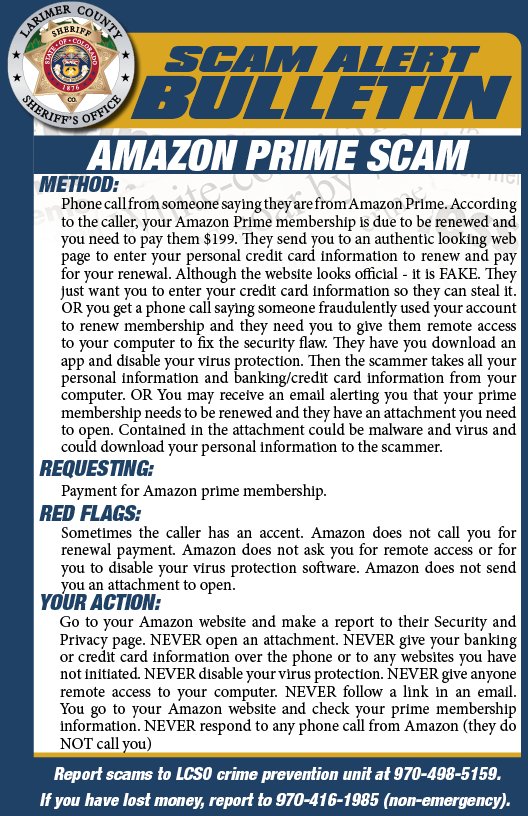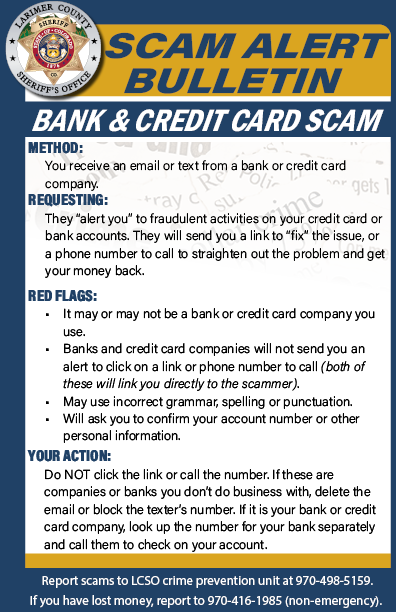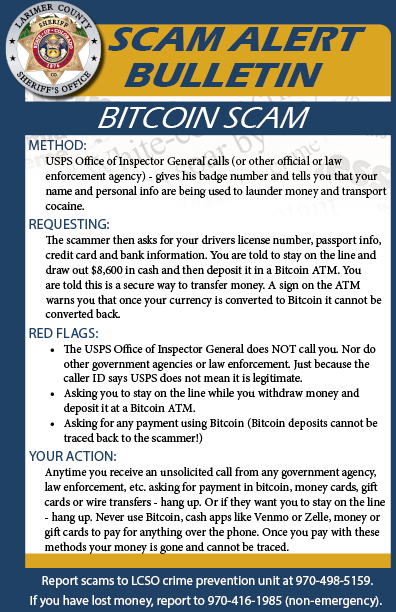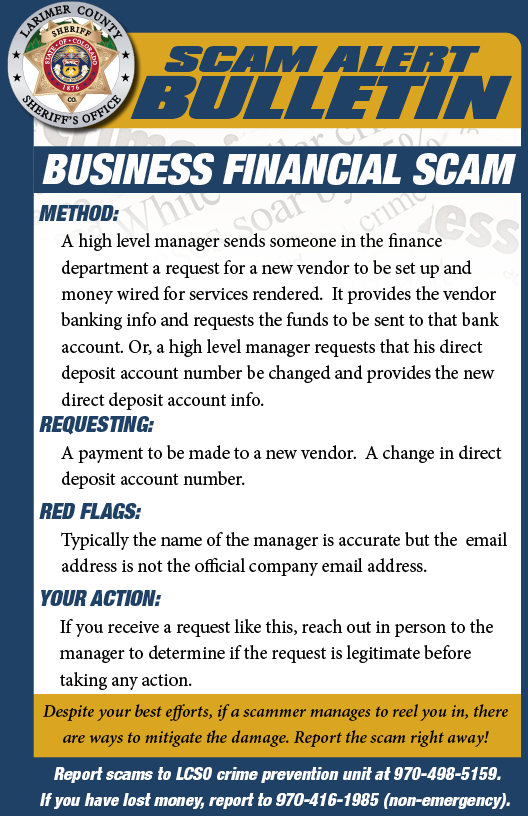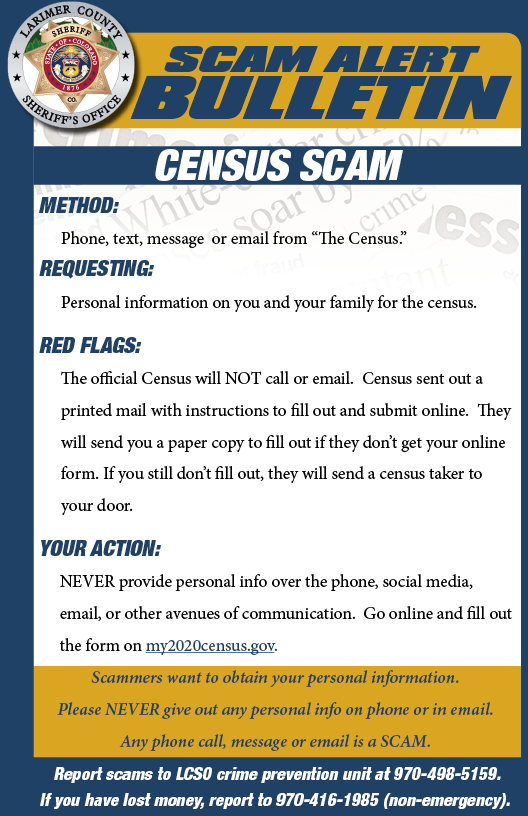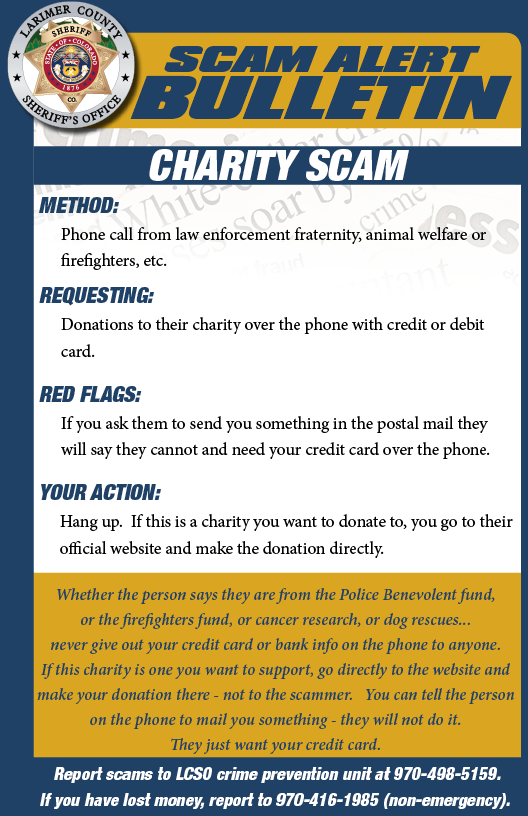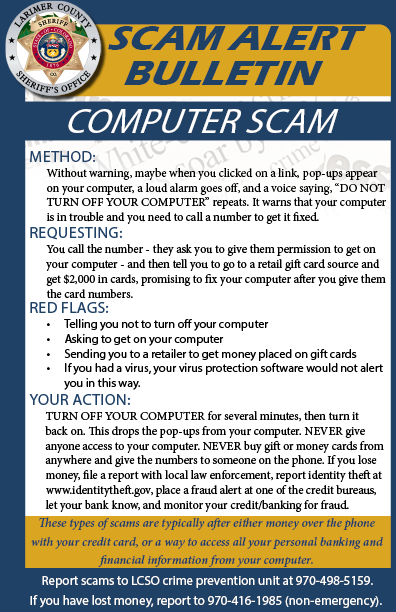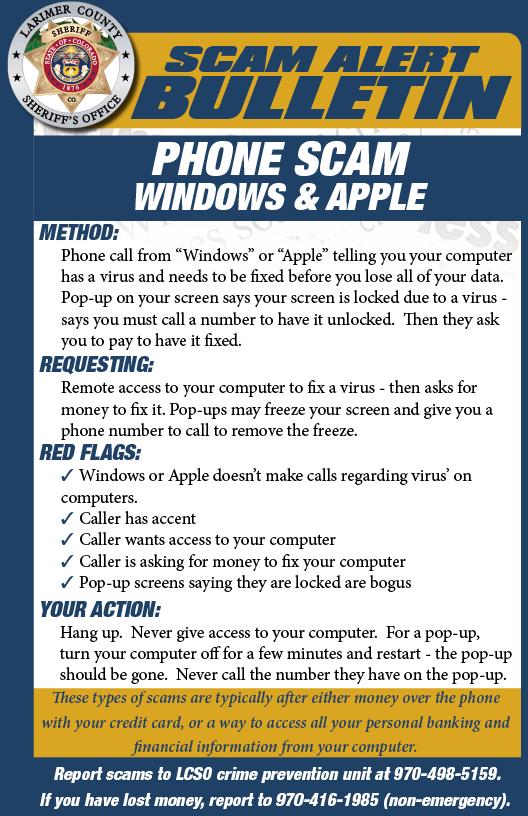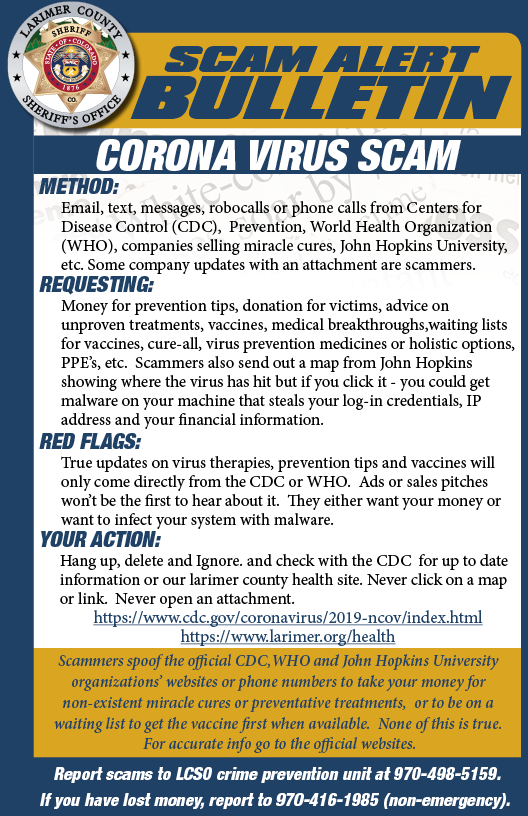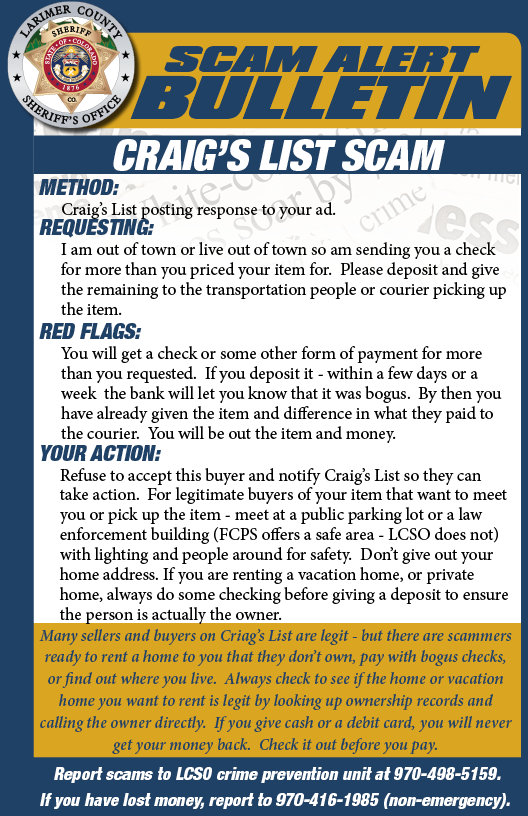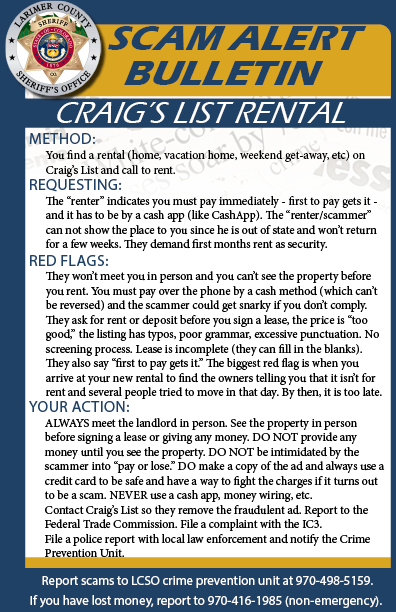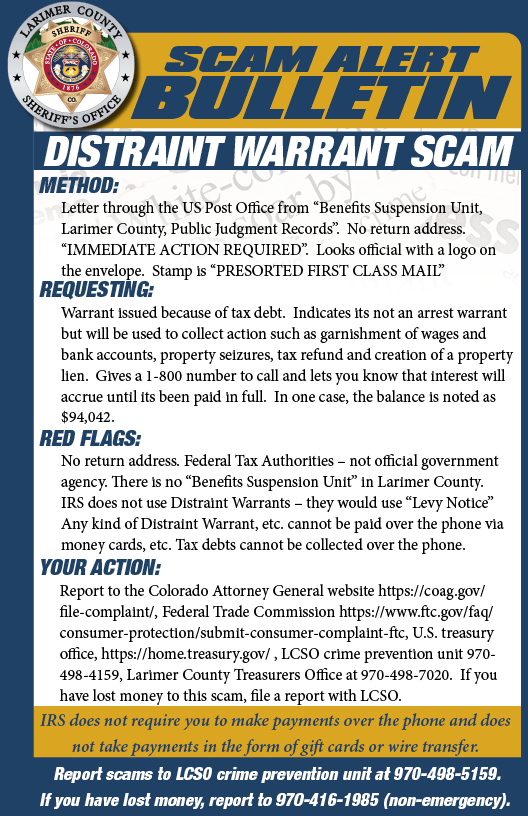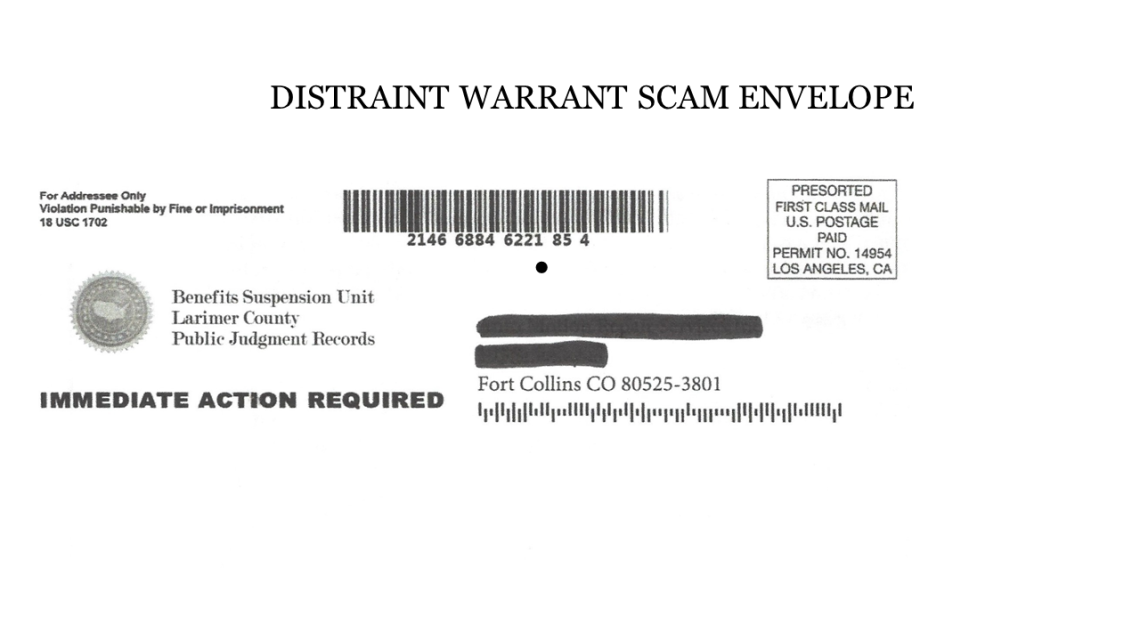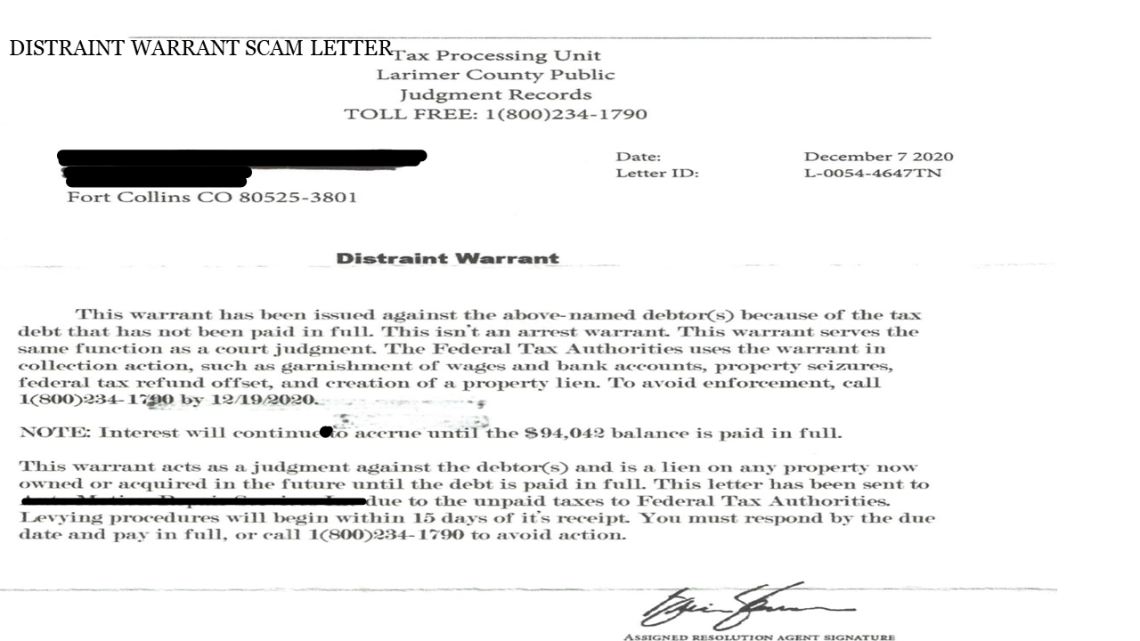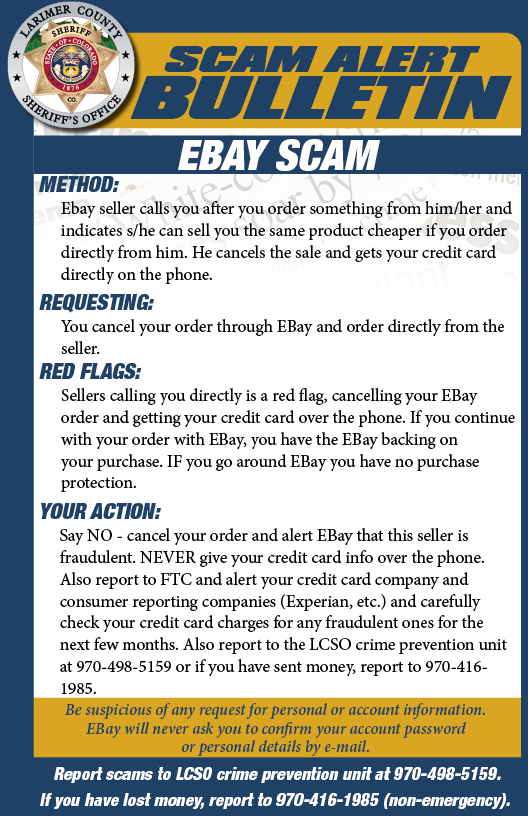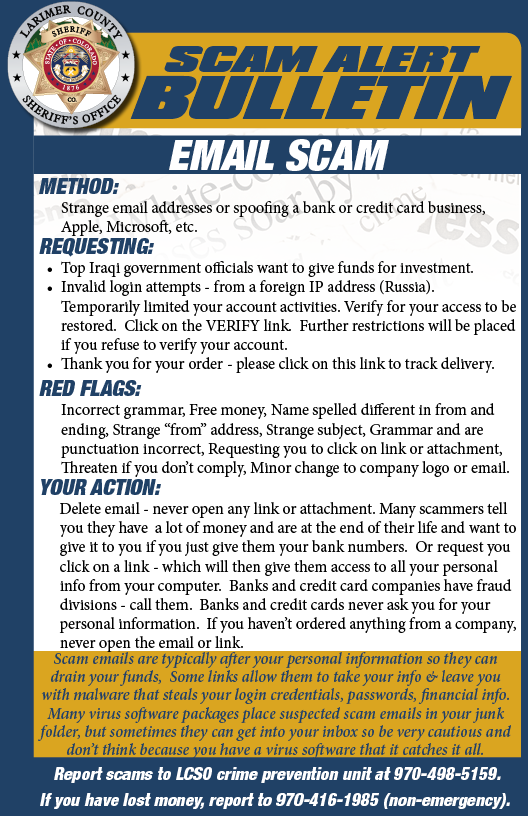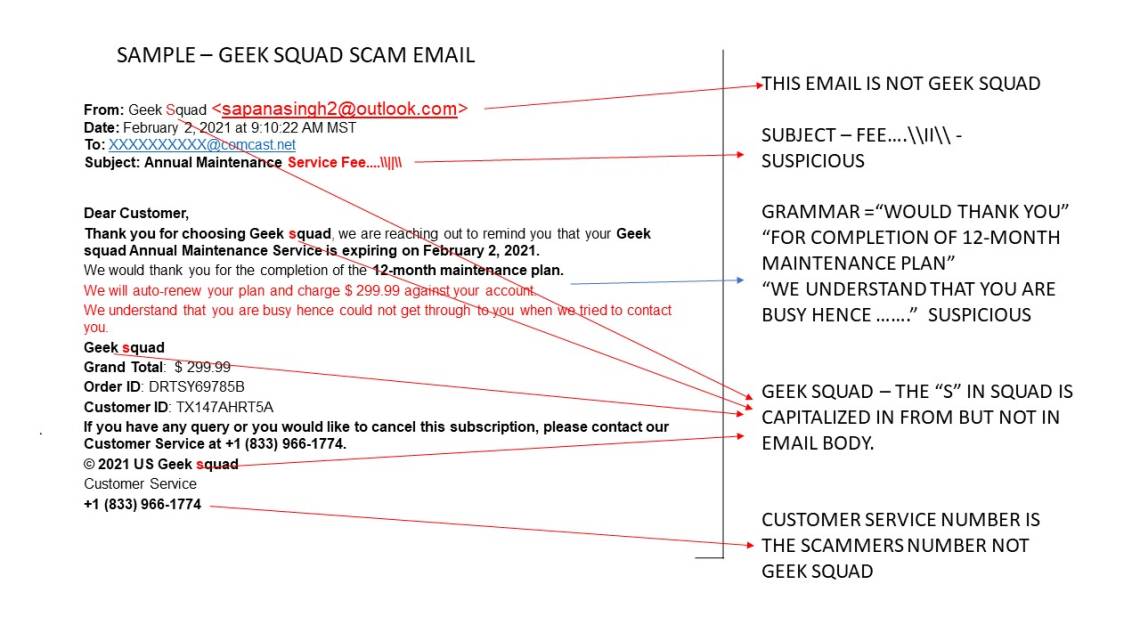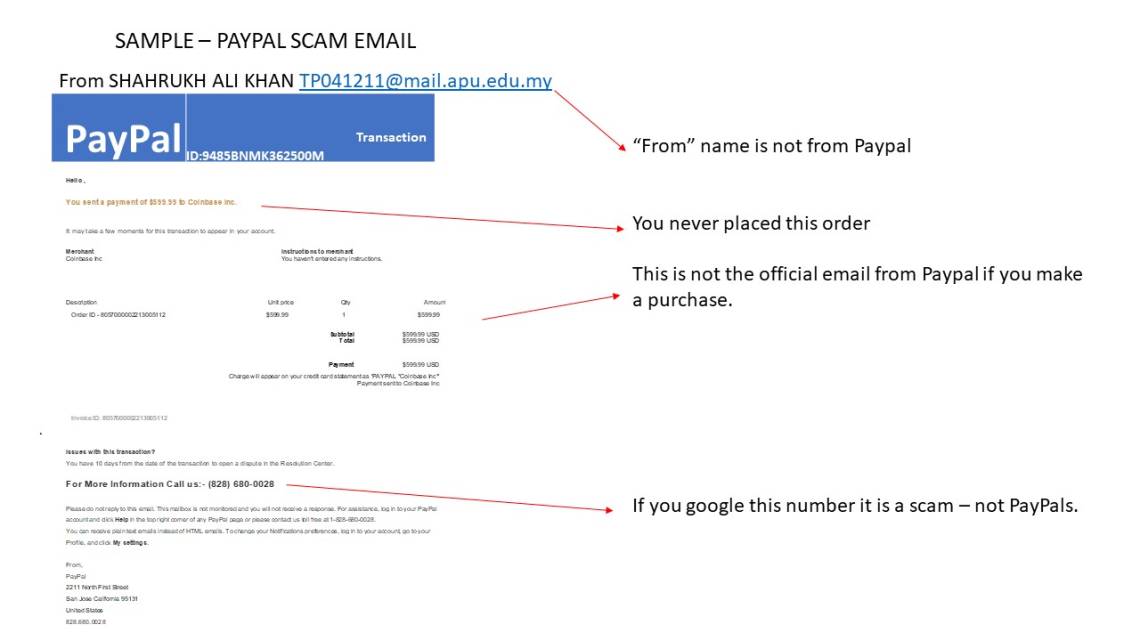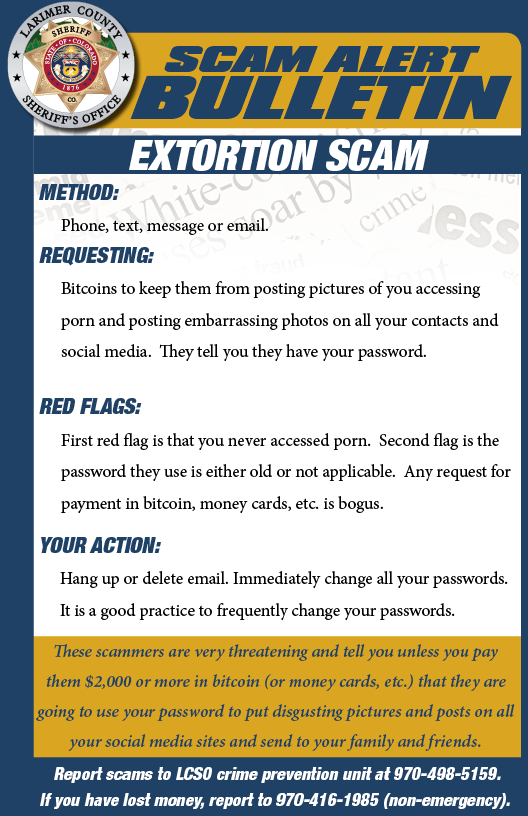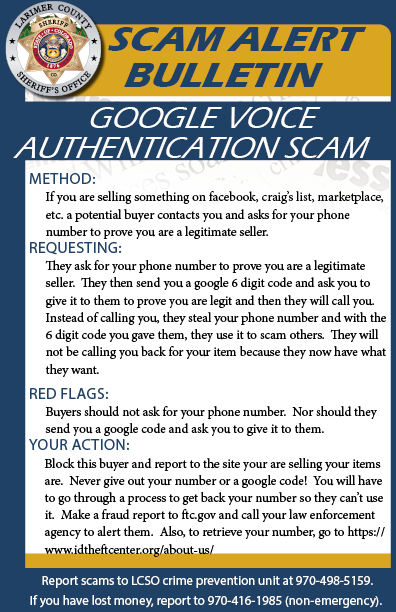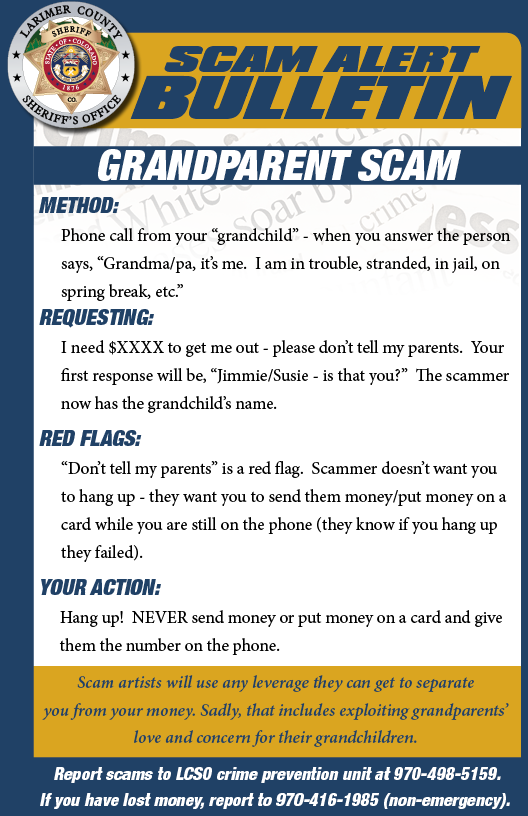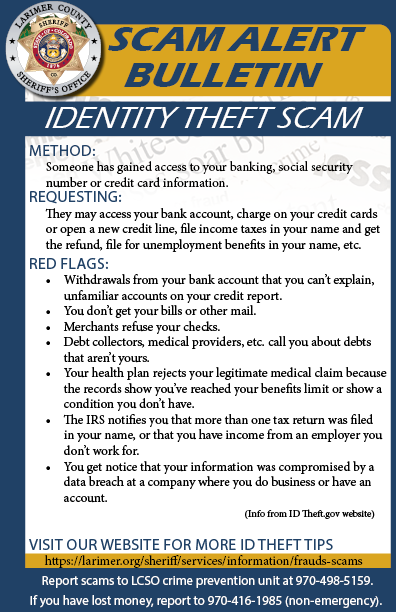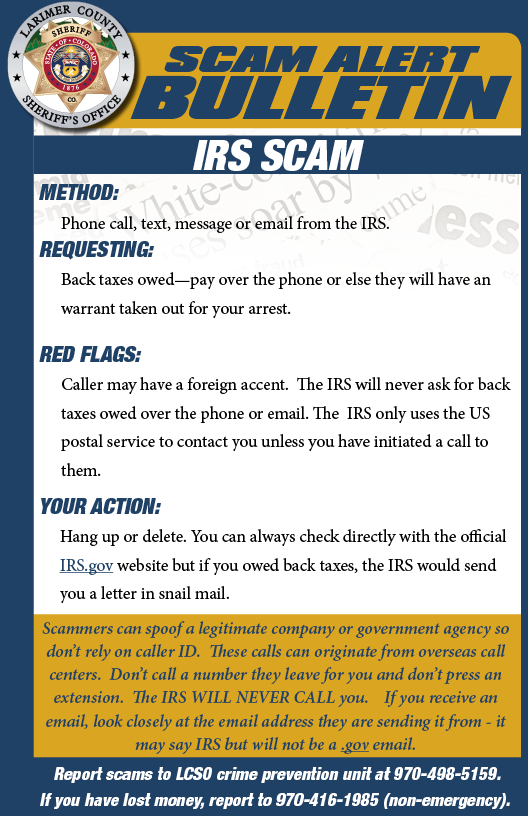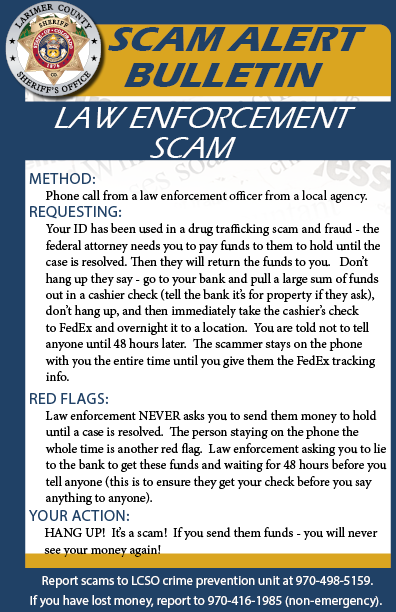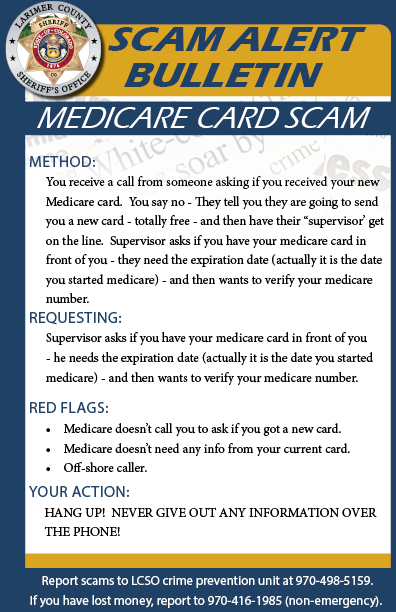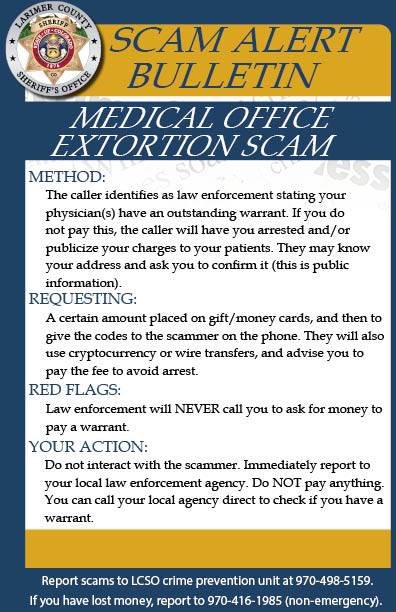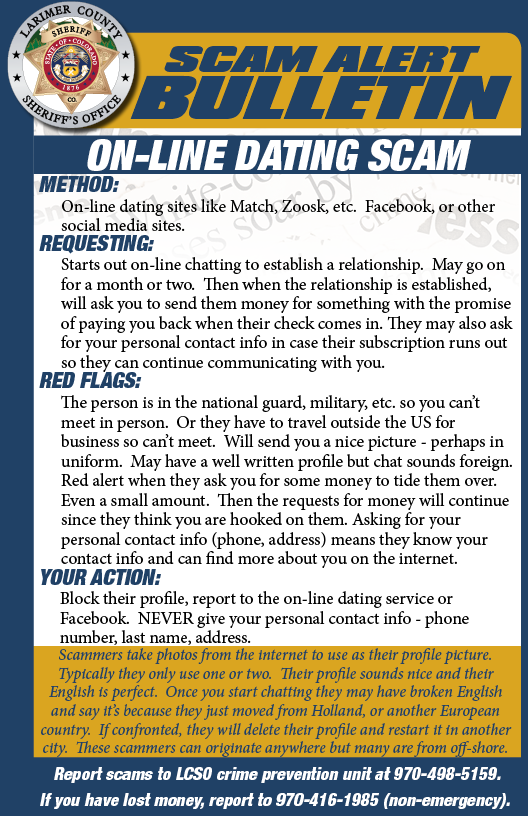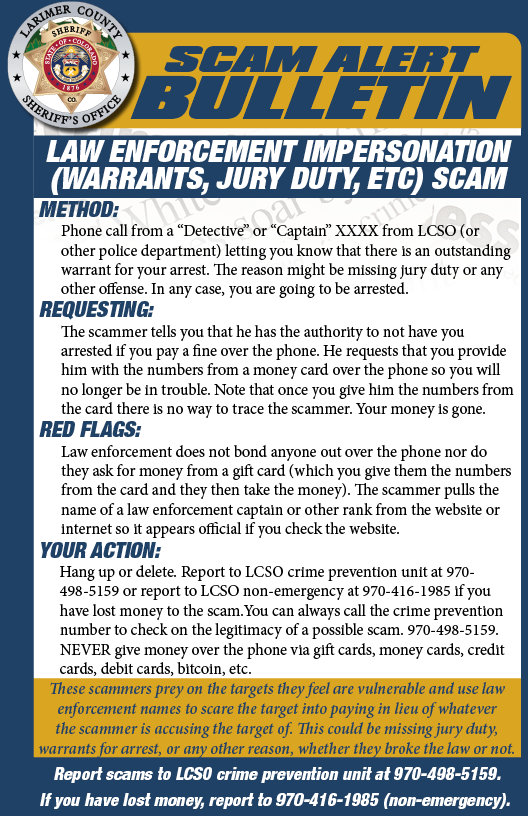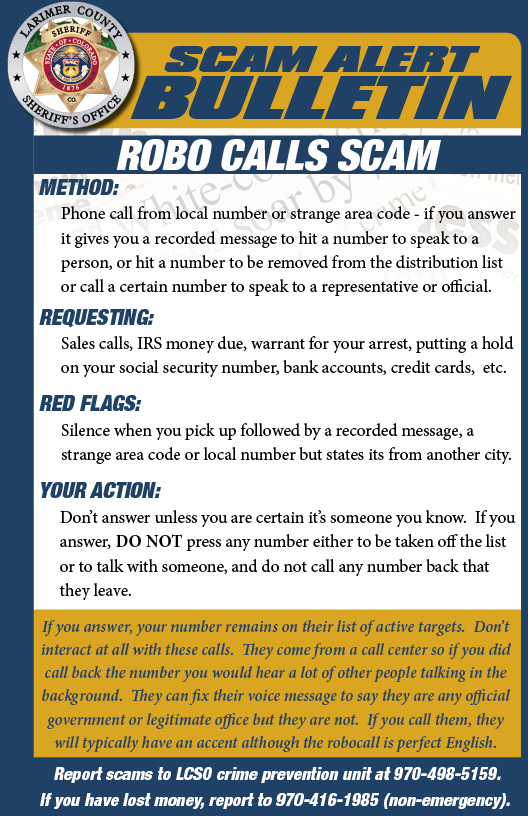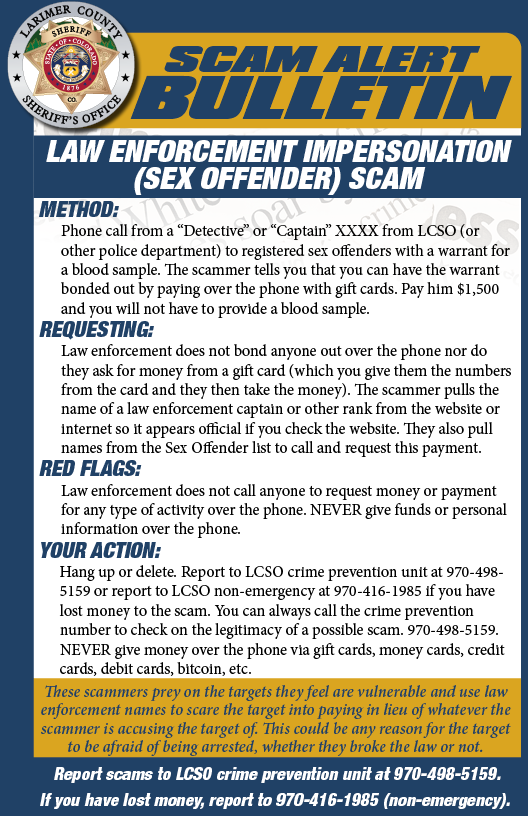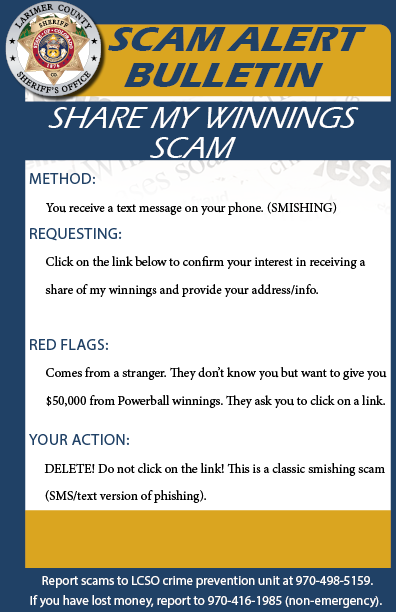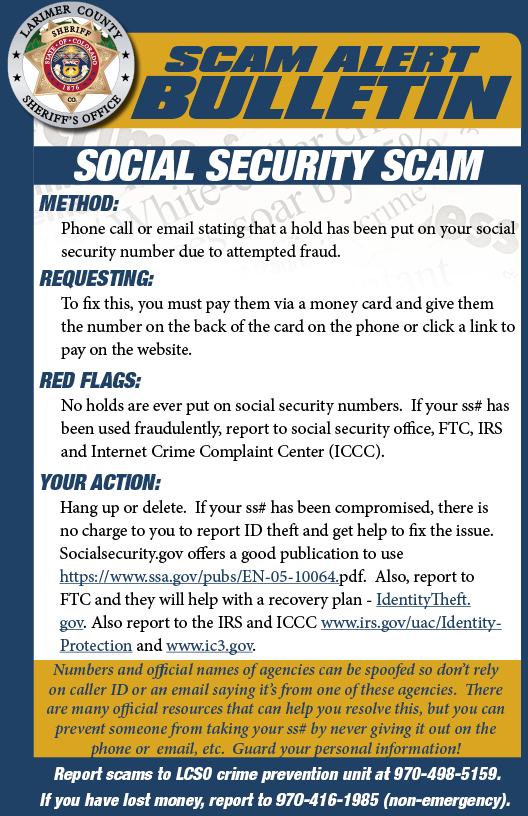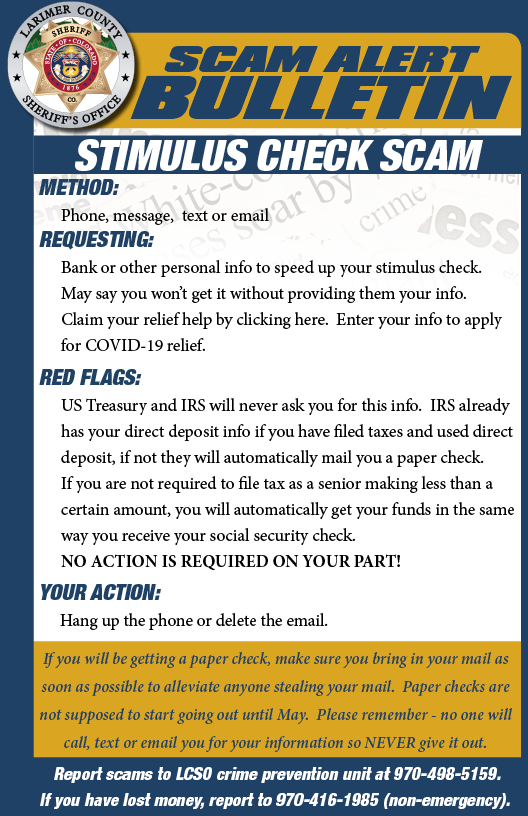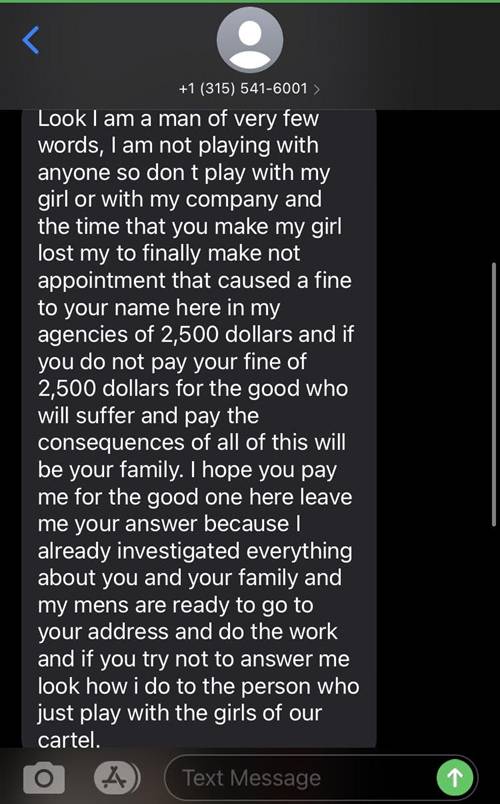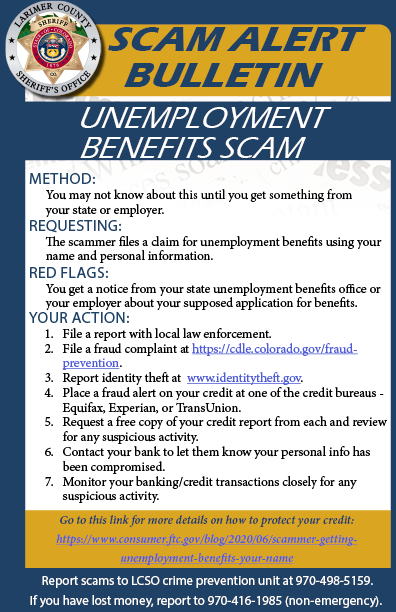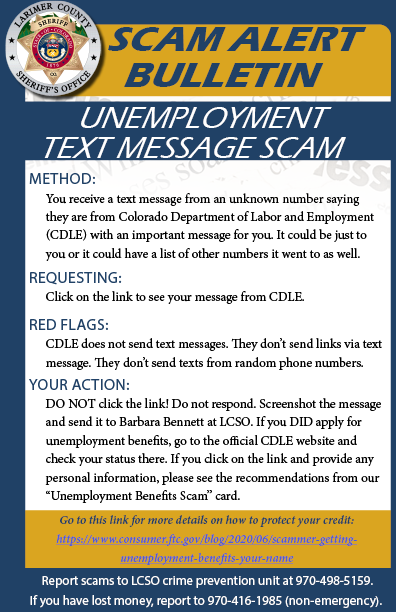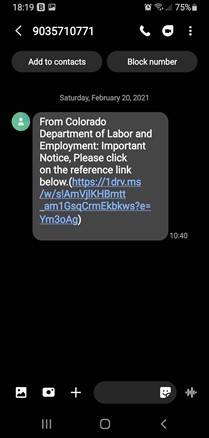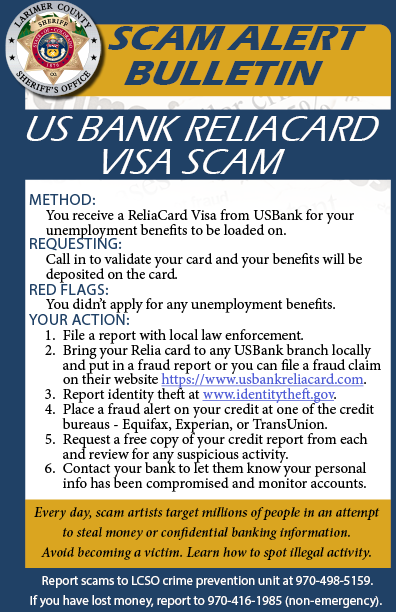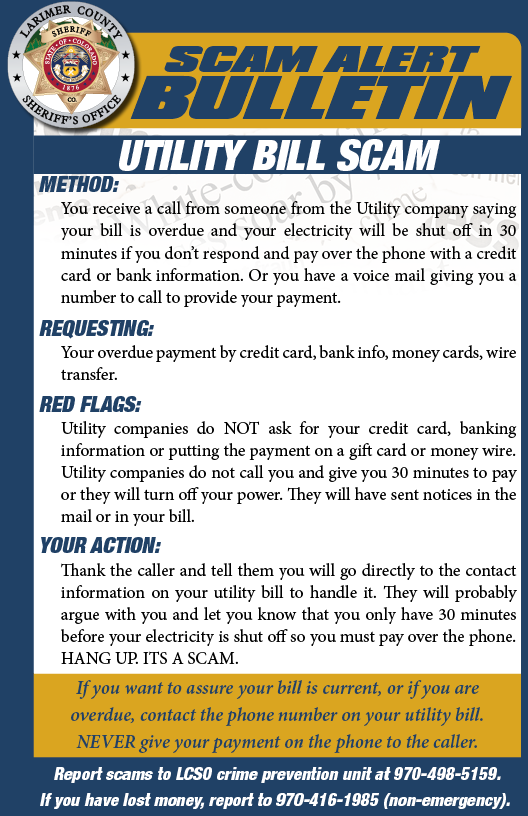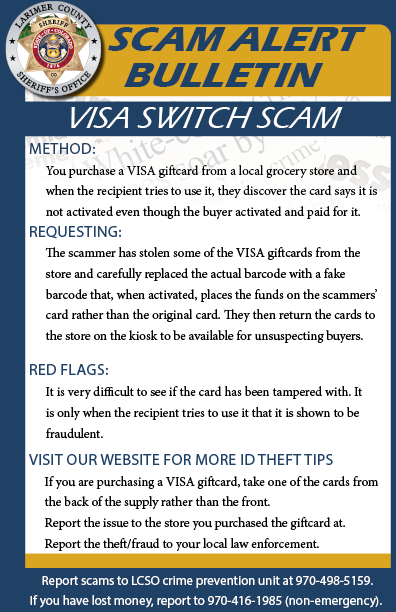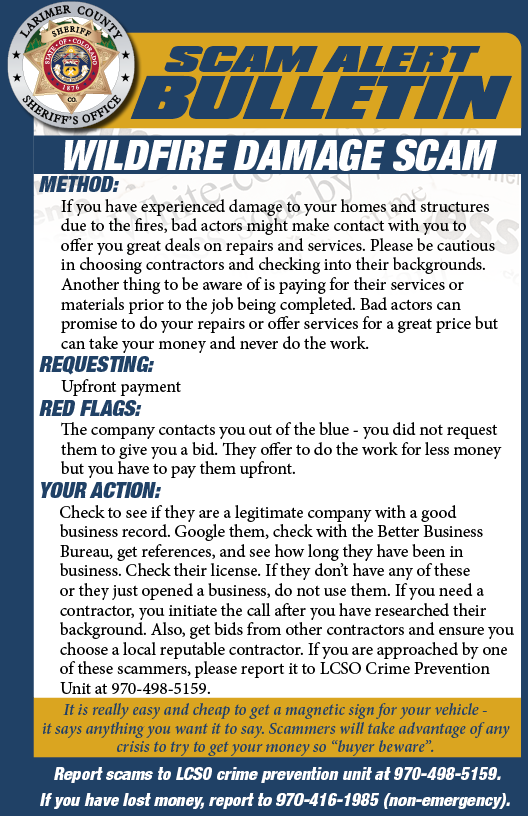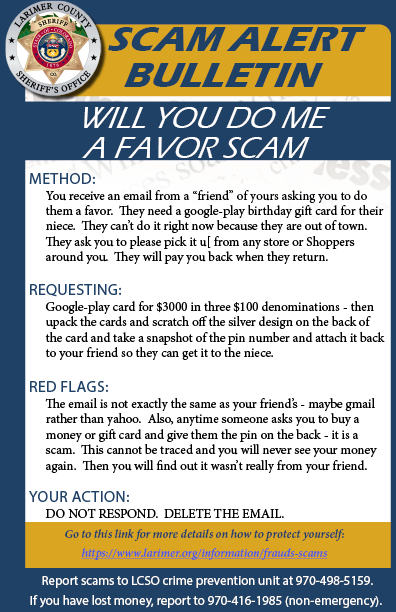Meet Barbara, LCSO's Chief ScamBuster
Who are you going to call if you get a call from someone wanting your hard earned money? Why, ScamBusters, that’s who.
All joking aside, over my last 13 years with LCSO, scams and frauds have become part of our everyday lives. My passion for being a huge pain in the ankle to criminals and scammers works well in my role as the coordinator of our Sheriff’s Auxiliary/Crime Prevention Unit. I love sharing ways that our citizens can become more in charge of their safety by knowing what is suspicious and what to do with that knowledge.
As scammers have become more sophisticated in targeting their prey and using human behavior techniques to make you think they are credible, we have to become more street smart and beat them at their own game. We do that by recognizing their tactics and learning how to build a safety wall around our personal information and finances. Knowledge is power - and it is easier to prevent scammers from taking advantage of our inherent trust in people than to try recovering after they have taken our hard earned money.
These criminal scammers can only be stopped by being aware that they are out there, understanding how they work, and being smarter than they are. This webpage has been established to provide information on what the scams are, how to recognize a scammer and how to be smarter than the scammer. If they can’t get our money - they have to give up. Let’s stop them in their tracks. Let’s all be ScamBusters!
Barbara EJ Bennett
970-682-0597
bennetbe@co.larimer.co.us
Coordinator - Sheriff's Auxiliary/Crime Prevention Unit
Larimer County Sheriff’s Office
P.S. If your group would like a scam presentation, give us a call or email to set it up. We love spreading the word! Also, feel free to send out this link to friends and family!
Overview
The scammer is targeting a wide audience to see who bites (phishing scam). Whether you get a phone call or an email, they want the same thing - your money and your credit card information. In the case of the caller sending you to a web page, it is very easy to assume it is legitimate - the logo is the same, the page layout looks authentic. In reality, it is the scammer’s web page and when you insert your personal information you are giving them access to your money, If they request you to download their app so they can fix your security flaw, they then ask you to log in to your banking or credit card site so they now have access to your funds.
Target Audience
All ages.
Emotional Play
Especially during Covid, people depend on ordering items online so want to ensure they can still get prime delivery.
Resources
Report to Amazon Security and Privacy page. Also monitor your Amazon charges very closely and your other credit cards and banking information for any suspicious activity.
Share
Overview
In this scam, someone will contact you, either by email or a text message, to let you know there is something wrong with your bank account or credit card. It may or may not be a company you do business with. They will give you a link to click or a phone number to call in order to fix the problem, and from there try to gather your personal information.
Target Audience
All ages.
Emotional Play
Like most scammers, these scammers will prey on your fear that something is wrong with your bank account or credit card. They will also try to scare you into thinking your money is at risk.
Resources
Look up your bank or credit card companies' phone number independently, and call them to confirm the status of your account.
Share
Overview
● Scammers have some favorite methods of collecting your money. Bitcoin or other crypto currencies that are said to be secure but once you exchange your currency for these currencies you cannot change it back. In addition, the scammer takes the money you have converted and they cannot be traced! Your money is gone.
● Cash apps - Venmo, Zelle, CashApp, etc. are great ways to transfer money directly out of your bank account to CLOSE FRIENDS, FAMILY AND TRUSTED BUSINESS. They are not safe for you to pay any stranger with any of these methods - you have no protection.
● Money or Gift cards - scammers love these - you give them the code on the back over the phone - they take the money and run. You have lost your money.
Target Audience
All ages - These are phishing scams.
Emotional Play
Fear of getting in trouble. Fear of losing your power. Fear of getting arrested.
Examples
● Your name and information has been used to launder money and transport
drugs.
● Your social security number has been used for nefarious activities.
● Missed jury duty - warrant for your arrest.
● You owe the IRS.
● Your energy bill is overdue - we are turning it off in the next 30 minutes if
you don’t pay with money or gift cards.
● Asking for a refund on a trip - but they tell you to pay via bitcoin a portion of
the fees/charges.
Resources
Report to law enforcement and file a fraud report.
Share
Overview
The email looks legit - it’s from a high level manager in your firm. The email sender has the right name but the email account address looks strange. Maybe from their personal account? Your first thought is to proceed with the request but STOP! Go to the manager and ask in person if this email is legit. Chances are good that it is a scam.
Emotional Play
Following direction from your management.
Target Audience
Small to medium sized businesses.
Resources
After this business described the scam to us, they installed some additional software that enabled them to catch incoming email as a potential phishing scam. Definitely a good tip for businesses!
Share
Overview
Scammers use the phone, email or texts to ask you to give them your personal information for the Census. This is not how the Census is being handled and they are just trying to get your personal info. The official Census has sent out a printed letter telling you where to go to fill in the census online. They will send you a second letter as well. They will never call you, text you or email you for this info.
Emotional Play
Wanting to "do my part" and be a good citizen.
Target Audience
All ages.
Additional Resources
www.census.gov
Share
Overview
We all have our particular passions - maybe its animal welfare, supporting law enforcement or firefighters, fighting medical challenges, etc. Scammers capitalize on these passions and use them to fraudulently take your money. Usually it’s a call asking you to donate online via credit card. If you request they send you info through the mail and you can send them a check, they indicate they can’t do that. What they really want is your credit card or bank info. If you want to support your charity of choice, go to their official website to donate safely - never on the phone.
Emotional Play
Love for a cause, supporting your passion, willingness to give to others.
Target Audience
All ages. Seniors are at particular risk because they are more trusting.
Share
Overview
Hearing all these warnings and alarms on your computer is certainly attention getting and very startling. That’s what the scammer wants. They don’t want you to turn off your computer because their scam pop-up’s will disappear and they can’t hook you. They want you to believe if you shut off your computer it will be devastating but the opposite is true. Just recently I had this happen to my computer twice in one week while I was doing research online. It startled me. I shut off my computer and restarted and all was fine. However, I got a call from someone that got the same alert and pop-ups and called the number. He was then told to go to Best Buy, purchase $2,000 in BB gift cards and give the caller the numbers on the phone. He did. The caller had already asked him to get on his computer – which he allowed. The scammer then downloaded banking and credit card info and got into the person’s bank accounts. In this case there is no way to get the money back. It is untraceable and the scammer has access to your banking and credit card.
Emotional Play
Fear of losing access to your computer.
Target Audience
All ages - the scammers don't know who's receiving their calls or pop-ups until you interact with them.
Share
Overview
You get a pop-up on your screen that locks it up. It says you have a virus and you need to call a number to get it removed. When you call, they want anywhere from $299 to $899 to fix your computer. WAIT. There is nothing wrong with your computer. DO NOT call the number. Just shut down your computer for a few minutes and when you turn it back on the pop-up will be gone.
Or you get a phone call from “Microsoft” or “Windows” or “Apple” saying your computer has a virus and they need to get on your computer remotely to fix it. They will charge you for this AND when you give them access they will download ALL your personal information such as credit cards, banking info, contacts, etc. In the case of the phone call - hang up. No one at these legitimate companies knows what is going on with your computer and would never call you to get access to your computer.
Emotional Play
Fear of losing access to your computer.
Target Audience
All ages - the scammers don't know who's receiving their calls or pop-ups until you interact with them.
Share
Overview
The last few months have brought unprecedented challenges for each person across our world, This virus has kept people in their homes, closed businesses and schools, and has permeated the news waves with constant fear of being exposed to this devastating virus. There are no known preventative medicines, vaccines or therapies, yet scammers have used this as an opportunity to sell you tests, preventative medicines,PPE’s, miracle cure therapies, or the opportunity to be the first in line to get the vaccine. This is all bogus. When any legitimate remedies are available, the CDC will let citizens know. They also have developed malware emails - one saying it’s from John Hopkins University with a map of COVID-19 patients. JHU does have such a map but they don’t send it out. The scammer is spoofing the return address as JHU and gives you a link to click to see the map. If you click on the link, they deposit malware on your computer to download all your personal information (bank, credit cards, etc.) We need to be very skeptical during this unsettling time and not fall for these scams.
Emotional Play
Fear, wanting to stay informed, curiosity.
Target Audience
All ages.
Additional Resources
Larimer County Department of Health and Environment
Centers for Disease Control
Share
Overview
When you post an ad on Craig’s list with a price determined for the item, the scammer will contact you with an offer of more than you are asking, but telling you the item will be picked up by someone else. They will send you a check, could be a cashier’s check, and tell you to deposit the check in your bank, keep your asking price and give the overage to the person picking it up for transportation cost. The bank may not discover the check is fraudulent for a few days so you will have already given the item and overage amount to the person picking up the item, then find out from your bank that the check is no good, you are out the item you were selling plus the overage cash. Best way to avoid these scams is never do business with someone offering you more than you are asking, or indicates they are out of state and will send someone to pick up the item.
Emotional Play
Financial motivation.
Target Audience
All ages.
Share
Overview
You see an ad on Craig’s List for a house or apartment for rent, a vacation home for rent, a mountain get away --- sounds wonderful. They post pictures of the property. They tell you they are out of the state or country so can’t show it to you. Or that they are the property manager and are representing the owners. The price is really good. They tell you many others want it so if you don’t get your deposit wired to them right away you will lose out. No credit cards accepted. Just wire them or use Cash app -- “wire transfer,” “money order,” “Western Union,” “Prepaid Visa,” and “Moneygram,” are all absolute red flag words. When you send money through these forms of payment, it is essentially impossible to get your money back. That’s why these forms of wire transfers are a scammer’s method of choice. Except in some cases - the renter placing the ad is a scammer and doesn’t have the right to rent this out. The real owner of the property doesn’t know what is going on until someone shows up on their doorstep to move in --- what a surprise for both of you. . The owner is in the dark so they aren’t responsible for your loss.
Another case is where the scammer says s/he is the property manager and actually shows you the property. This is made possible by the property actually being on a legitimate property management website where you can “show yourself” property where you can register and get info to let yourself in to view the property.
The Craig's List scammer doesn’t have you fill in an application but you must get your deposit in right away via CashApp.
Emotional Play
Great offer (good location, good price), fear of missing out on the deal.
Target Audience
All ages.
Resources
Report to Craig's List, local law enforcement, and file a complaint with the FTC.
Share
Overview
You may receive a text, email or phone call indicating there is a delivery scheduled. This could be from FED-X, UPS, USPS or Amazon. They may say that before the package can be delivered, you need to pay the shipping or the price of the item. You may not even remember ordering anything. Or they give you a link to click on to get more information. Since spoofing a legitimate company logo is easy to do, you should not rely on the message being legitimate if its asking you to pay for shipping or the price of the item. If legit, these charges have already been paid when you ordered the item.
Emotional Play
Curiosity, material and/or financial gain.
Target Audience
All ages.
Share
Overview
This is an attempt to defraud you with an official looking letter.
Target Audience
All ages.
Emotional Play
Fear.
Resources
When in doubt, call the LCSO Crime Prevention Unit to discuss a suspicious letter.
Share
Overview
Someone comes to your door and offers to check your roof for damage from the recent storm. When they tell you about the damage, they offer you a great deal for them to fix it for you. Pay them half (or full) upfront and they will do the work for you. STOP! Even if they have a sign on their truck indicating they are a contractor, it is very easy to get a magnetic sign saying any company name. These scammers go door to door after a weather incident to see if they can con you into believing you have damage. If you think you might, you should call a reputable company to come out and check your roof. Most cases, there is no damage but the scammer just wants your money.
Emotional Play
Fear of damage to property.
Target Audience
All ages, seniors often targeted.
Share
Overview
Typically EBay sellers are legitimate sellers and when you order through EBay you have a purchase protection that comes with the purchase. Some bad actors are posting something for sale on EBay and then when you order it they call you directly and give you a better deal on the item if you go around EBay. This of course leaves you high and dry should the seller be a bad actor. You not only give them your credit card number which they can use however they want, but you will not get your item and have no recourse through EBay.
Target Audience
All ages.
Emotional Play
We love a better deal! Save money.
Resources
Report to EBay, FTC, credit reporting companies. Watch your credit transactions for any suspicious charges.
Share
Overview
An email hits your inbox from a seemingly legitimate company. Apple, Microsoft, Amazon, credit card company, a bank, or a high ranking official from another country. They might say there is a problem with your account and you need to click on the link they provide, or the high ranking official or other overseas person has a lot of money they would like to give you (you are deserving, they are dying and want to share their wealth, etc.). Company names are easy to spoof and the scammer really wants your credit card number or your banking information (so they can deposit millions in your account.) Remember - never click on a link and if it sounds too good to be true (like a stranger wanting to give you millions of dollars) it is not true.
Emotional Play
Fear of fraudulent use of your accounts, or financial benefit.
Target Audience
All ages.
Examples and Additional Info
Emails can look very official from companies you might have done business with in the past. Company logos can be easily copied as can information from a legitimate business’ website. There are typically little red flags to alert you to possible suspicious activity, as shown on the examples. The sender gives you a link, website, or phone number to call. Links can provide the scammer with your personal information from your computer as well as a virus to your computer. The phone number and website are the scammer's – not the official ones, so when you call you are speaking to the scammer’s call center
Share
Overview
These emails are very disturbing, threatening, accusatory and disgusting. The scammer has a password you may have used in the past or makes one up to bluff. Tells you s/he has access to all our contacts, social media sites and websites. If you don’t comply s/he will post disgusting things on all your sites and to your contacts about you using porn and other things. They tell you they have access to all your internet usage and they know you are watching porn. They also give you a timeframe to provide them their ransom (typically $2,000 in bit coins) or they will unleash their destruction on you.
Emotional Play
Fear, embarrassment.
Target Audience
All ages.
Share
Overview
Facebook and other social media sites typically have sponsored advertising on their sites. Some of these are legit and many are not. Export distributors represent many overseas companies and take orders for them. It may take months for your product to arrive - during Covid, overseas products will be sent by ship due to flight restrictions, which can then sit in customs for weeks after weeks of transit time. It could be 3 months before you get the product and the company will tell you it’s on the way. In many cases, the product you see on the ad is a really nice picture - but the product you receive is junk and not worth anywhere near what you paid. When you try to get a refund - they say you have to pay to return the product overseas and when they receive it they will refund. Or they say no refund just because you don’t like what they sent.
Emotional Play
Emotional purchase, unique product or discounted price.
Target Audience
All ages.
Resources
If you pay by PayPal, go through the escalation process if the company balks. If by credit card, dispute the charge and give your reasons. If you never receive the product, also report as fraud.
Share
Overview
There are many different selling/buying sites such as marketplace, facebook, ebay and craig’s list. Buyers will not have any reason to ask for your phone number when they are inquiring about the item you are posting for sale. Scammers, however, will ask to get your phone number for verification to the potential buyer that you are legitimate. Then they send you a google 6 digit code and ask them to give it to them for authentication that you are legit and then they will call you to set up a meeting time. They will not call you because all they want is your phone number and the verification code so they can set up a phony google voice account to post fraudulent items for sale under your phone number. In essence, they will use your phone number to scam other people.
Emotional Play
You want to sell this item!
Target Audience
Anyone selling items on these sites.
Resources
You will have to go through a process to regain your phone number from the scammer. Go to https://www.idtheftcenter.org/about-us/ for information on how to do this. Also report to the FTC.
Share
Overview
Using the very strong devotion to grandchildren, scammers will pretend to be your grandchild (Hi, grandma/pa - and you respond with “is that you Jimmy?”) They spin a tale about getting pulled over with dope in the car, running out of money, or other stories about being arrested. They also will ask you not to tell their parents. In some cases, they will even pass the phone over to the “police officer” so he can tell you what happened and how much the grandparents need to pay to get their grandchild released. They also will stay on the line while you go to the bank or money card location to put the money on a card and provide the “officer” the code from the money card. They won’t let you hang up because they don’t want you to call the parents and find out the grandchild is not in trouble.
Emotional Play
Love for grandchildren, protective, concern for their safety.
Target Audience
Seniors with grandchildren.
Additional Resources
Larimer County Office on Aging
Share
Overview
Once a fraudster gets your personal information, they can use it to access your finances, open credit card accounts in your name, and other nefarious acts with your info. Once you suspect you might be a target of ID theft, please take immediate action (under Resources below) to ensure the fraudster cannot continue to have access to your accounts.
Target Audience
Anyone.
Emotional Play
Fear is the root. Threat of a virus on your computer, false charges of money.
Resources
- File a report and develop a recovery plan at https://www.identitytheft.gov/#/
- Place a free, one-year fraud alert by contacting one of the three credit bureaus. That company must tell the other two:
- Experian.com/help 888-EXPERIAN (888-397-3742)
- TransUnion.com/credit-help 888-909-8872
- Equifax.com/personal/credit-report-services 800-685-1111
- File a police report to your local law enforcement (in unincorporated Larimer County, report to 970-416-1985).
- Complete the online form on the FTC website or call 1-877-438-4338. Include as many details as possible.
- Contact your bank and other businesses that fraud has occurred.
- Close out any accounts opened fraudulently.
- Change all your login and passwords.
Share
Overview
You owe the IRS back taxes! Or so the caller says - either in person or by robocall. Who wants to be guilty of that! The problem with this is that the IRS never uses a phone call to let you know you owe back taxes, They send you a letter through the US Post Office. And they never ask you to pay through money cards or other sketchy methods.
Emotional Play
Fear of arrest, desire to be law abiding.
Target Audience
All ages.
Share
Overview
A very official person calls you telling you his name is James XXXXX from XXXX law enforcement agency. He tells you that your ID has been used in a drug trafficking operation and the federal attorney on the case needs you to pull out a large amount of funds for the federal attorney to hold until the case is resolved. While the scammer is still on the phone (THEY ALWAYS STAY ON THE PHONE because if you hang up they have lost you!) they send you to your bank to withdraw the funds in a cashier’s check. If the teller asks why you need the large sum, the scammer tells you to say you are buying property with it. They then tell you to go directly to the FedEx office and overnight it to them. You are instructed NOT to say anything to anyone about this for at least 48 hours. They also tell you that when the case is resolved they will return your money. Why 48 hours? Because your check will arrive in 24 hours, they will cash it and be gone before you tell anyone and find out its a scam. Will they return the money? Not a chance.
Emotional Play
Fear of getting in trouble. Following directions from an authority figure (law enforcement officer).
Target Audience
More vulnerable and trusting population.
Resources
https://ftc.gov and local law enforcement crime prevention.
Share
Overview
You have won! Money! Vacation! Free lodging! Sweepstake! Lottery! WOW. But guess what - you only have to pay a handling and shipping fee! What a deal! It’s like Christmas! Oh wait - my Christmas presents don’t come with a shipping and handling fee. These are just scammers trying to get money from you. The old saying, “if it’s too good to be true, it isn’t true.” If you won any of these prizes, it would be free.
Emotional Play
Excitement of getting a prize.
Target Audience
All ages.
Share
Overview
Someone calls you (with an accent) and
wants to know if you got your brand new
medicare card yet. They let you know it's
totally free and they won’t ask you for any
money. If you say you haven’t received it
they will put their “supervisor” on the phone
who asks you if you have your medicare card
in front of you. They need some information
from your card (your red flag should be
waving at 100 mph by now) – what they are
trying to get is your personal info from your
card. The supervisor actually told me he
would wait until I got my card in front of me.
If you say you got it, they will want to verify
the info from the card. They may even
threaten you with canceling your medicare if
you don’t give them the information. They
are not sending you a new one, nor are they
from Medicare. New medicare cards were
automatically sent out when they replaced the
old cards with your social security number on
the cards to protect you from scammers. So
now the scammers have to get the new ID
number from you so they can scam you.
Target Audience
Anyone of Medicare age.
Emotional Play
Fear - "I need to get my new or updated Medicare card. I don't want to lose my Medicare!"
Resources
Just hang up. NEVER give out your personal information to anyone over the phone. These callers are from a call center off-shore. Real Medicare employees NEVER call you. If you have questions on Medicare - call their number directly at 800-633-4227.
Share
Overview
Scammer calls you stating you have an unpaid warrant.
They use a spoofed number from the Sheriff's Office
(or police department) and identify themselves as a Deputy,
Officer, Sergeant, etc. If you don't pay with a money/gift
card, or other unusual form of payment, they will "destroy"
your reputation, and you will be arrested.
Target Audience
Medical practices (but this scam can be used on other
businesses that have clients and rely on a good reputation).
Emotional Play
Fear of damage to your practices' reputation. Fear of arrest.
Resources
Report to your local law enforcement. In Larimer County, if you have not lost money, contact Barbara Bennett
at 970-498-5146 to report the scam.
Share
Overview
These scammers prey on the human need for companionship. They develop a nice profile and use one photo depicting a nice looking person (male or female) and place it on the various dating sites. Sometimes you will notice awkward grammar when they start chatting with you. They always have a reason for not meeting in person. They may say they are in the military and are going out of the country for a few months, They may spend a month or two “courting” you before they ask for money. They count on you being too embarrassed to report them when you figure out they are scammers. Typically they are from overseas locations.
Emotional Play
Loneliness, romance, companionship, reluctance to report (embarrassment).
Target Audience
All ages. Seniors and grieving people most vulnerable.
Share
Overview
These scammers prey on the targets they feel are vulnerable and use law enforcement names to scare the target into paying in lieu of whatever the scammer is accusing the target of. This could be missing jury duty, warrants for arrest, or any other reason for the target to be afraid of being arrested - whether they broke the law or not. Most citizens are law abiding so are horrified to think that they have broken the law and might be arrested.
Please remember - law enforcement does not call anyone to request money or payment for any type of activity over the phone. NEVER give funds or personal information over the phone. If you have questions about a call like this, call the crime prevention number (970-498-5159) to ask if the call is legitimate or not.
Emotional Play
Fear of being in trouble, protecting your good name.
Target Audience
All ages.
Additional Resources
Call your local law enforcement agency to verify any contact received by phone:
- LCSO 970-416-1985
- Fort Collins Police Services 970-221-6540
- Loveland Police Department 970-667-2151
- Estes Park Police Department 970-586-4000
Share
Overview
You answer your phone or get a voice mail indicating your credit card, bank account have been used fraudulently and you must call back or hit a number on your keypad to speak to someone to help you. They also indicate, if a sales call, that you can be taken off the call list by pressing a certain key. The best way to deal with these calls is to not call back and do not press any number. Just delete.
Emotional Play
Fear, they want you to act quickly without thinking.
Target Audience
All ages.
Examples
We need to speak to you about a warrant for your arrest
We need to speak to you about a person in your family missed court
We need to speak to you about fraudulent use of your credit card, or bank account
Share
Overview
People have been receiving packages of seeds from China. They were never ordered - they just showed up. Or they receive some item that they never ordered. As much as we love planting things - be aware that these seeds could have bugs or other things we don’t want here in the US. Please use the process stated in the bulletin for taking care of these seeds. Don’t throw them away because they can still spread whatever they have. If you received some item you didn’t order - you do not have to return it. Nor do you have to pay for it.
Emotional Play
Free stuff. Curiosity (What will the seed sprout?).
Target Audience
All ages.
Resources
Watch your credit card and bank statements for any transaction that you didn't make to ensure you are not getting billed for something you didn't order.
Share
Overview
These scammers prey on the targets they feel are vulnerable and use law enforcement names to scare the target into paying in lieu of whatever the scammer is accusing the target of. Sometimes they will target registered sex offenders due to the public record of their information. The scammer will tell the victim that they missed some administrative supervision requirement and will be arrested unless they pay money.
Please remember - law enforcement does not call anyone to request money or payment for any type of activity over the phone. NEVER give funds or personal information over the phone. If you have questions about a call like this, call the crime prevention number (970-498-5159) to ask if the call is legitimate or not.
Emotional Play
Fear of being in trouble, protecting your good name.
Target Audience
All ages.
Additional Resources
Call your local law enforcement agency to verify any contact received by phone:
- LCSO 970-416-1985
- Fort Collins Police Services 970-221-6540
- Loveland Police Department 970-667-2151
- Estes Park Police Department 970-586-4000
Share
Overview
There are many wonderful people in the world that are willing to share their fortune with others. BUT there are more scammers who say they will share but need your personal information to do it. You don’t know this person and even if you know you are special, this stranger isn’t really giving you this share of his winnings because he thinks you are special. This really could be the name of the winner, and his picture might even be legit - but the person sending it and the link are not legit - they are just using his name and picture. They want your personal info and maybe even a payment in order to process this.
Target Audience
Anyone with a cell phone.
Emotional Play
Free money / windfall / economic relief. "Wow, I can get caught up!"
Resources
Report the message to your cellular provider and delete it.
Example
I'm Mr. Manuel Franco, the Powerball winner of 768 Million in Powerball Millions Jackpot, click here to see my winning interview https://www.youtuxe.com/watbh?v=sT--2y1G7zC0 (FAKE LINK) I'm donating to 200 random individuals. If you get this message then your number was selected after a spin ball. I have spread most of my wealth over a number of charities and Organisations. I have voluntarily decided to donate the sum of 50,000 USD to you as one of the selected 200, to verify your winnings send a text to the agent in charge. Here is the number of the agent Donald Creed in charge (+13302577558), text him for confirmation and delivery of your winning.
*link changed to avoid someone clicking on it.
Share
Overview
You receive a call or email alerting you to the fact that your social security number has been used in fraudulent activities and has been placed on hold. They want you to contact them to provide your personal information and money since you could be arrested or have legal action taken against you. This is a scam.
Target Audience
All ages, focused on people receiving Social Security benefits.
Resources
Social Security Fraud Hotline 1-800-269-0271
Example
Scammer message: Department of the Social Security Administration. The reason of this call is to inform you that your Social Security number has been suspended for suspicion of illegal activity. If you do not contact us immediately, your account will be deactivated. For more information about this case file, press 1 or call immediately our department number XXX-XXX-XXXX.
Share
Overview
The pandemic has created many emotions - fear, unrest, isolation, financial worries, helplessness and many other feelings that typically are not as strong or active as they are during this time. Many people are depending on the recovery/stimulus check that was promised by the Federal Government. Scammers saw a way to capitalize on this to offer a way to get your stimulus check faster by giving them your bank details.
Emotional Play
Financial worries, fear, frustration.
Target Audience
All ages. Seniors and those who do not use direct deposit most vulnerable.
Additional Resources
Internal Revenue Service
Share
Overview
This threatening scam has been happening in other parts of the US but is now popping up in Northern Colorado. Using public information, it attempts to make you think you have messed with someone related to the cartel and now you are being fined $2,500 or other amount. If you don’t pay, they threaten to hurt your family and they include gory pictures of mutilated /murdered bodies to make sure you know they mean business. They say they have researched you and know everything about you - but they really only have the public information.
Emotional Play
Fear
Target Audience
All Ages
Resources
Send any documentation to LCSO - Barbara Bennett. Do not respond, Make a fraud report on ReportFraud.ftc.gov.
Share
Example
Overview
There is a TV ad, a phone call or an email offering you a fabulous product for free - just pay a small amount for shipping/handling. You have 30 days to try it! Sounds great, right? Well, in the really small print, it says you must return the product within 30 day otherwise you will be billed for the full amount. In addition, you will be signed up for a monthly subscription for a product every month and you will be billed at full price. The full price of the product is quite expensive and the 30 day window starts when you order, not when you receive the product. It could take up to two weeks to receive the product. The company has your credit card so will bill you continuously.
Emotional Play
Hope that the product will help you look younger, the product will help you lose weight, help prevent you from getting sick, etc. Embarrassment to report.
Target Audience
All ages.
Share
Overview
This scam has really hit during the COVID 19 pandemic to take advantage of those that have not applied for unemployment benefits. The scammer has and is misusing your personal information, including your Social Security number and date of birth.
The unemployment payments usually are deposited to accounts the imposters control. But sometimes payments get sent to the real person’s account, instead. If this happens to you, the imposters may call, text, or email to try to get you to send some or all of the money to them. They may pretend to be your state unemployment agency and say the money was sent by mistake. This a money mule scam and participating in one could cause you more difficulties.
ADDITIONAL INFO
If you have received a 1099 for unemployment you have not applied for, please ensure you follow the recommended action in the Unemployment Benefits Scam card to protect yourself. In addition, the Colorado dept of Labor and Employment provides the following info:
If you have received a 1099-G document from the Colorado Department of Labor and Employment but did not file a claim for unemployment benefits, you may be a victim of identity theft. Unfortunately, fraudsters steal or purchase private information from illicit data brokers and use that information to file fraudulent unemployment claims. While we have a sophisticated multi-factor program in place to flag suspected fraud, no system is perfect.
Here’s what you should do if you’ve received a 1099-G document from the Colorado Department of Labor and Employment but did not file a claim for unemployment benefits:
- Report it using the Report Invalid 1099 form. https://co.tfaforms.net/f/Report_Invalid_1099
- For more info on the scam - https://cdle.colorado.gov/tax-form-1099-g
- Contact the three consumer credit bureaus and put a fraud alert on your name and Social Security Number (SSN). Credit Bureau Contact Info: Equifax: 1-800-525-6285 | Experian: 1-888-397-3742 | TransUnion: 1-800-680-7289
For more information from the IRS, go to https://www.irs.gov/newsroom/irs-offers-guidance-to-taxpayers-on-identity-theft-involving-unemployment-benefits
Emotional Play
Fear of negative impact.
Target Audience
Anyone who hasn't applied for emergency unemployment benefits.
Resources
Colorado Department of Labor - Report Fraud Here
Federal Trade Commission - Unemployment Benefits
Share
Overview
This is a variation of the Unemployment Benefits Scam, just using a different way of reaching you. Clicking on the link will allow the scammer to take your personal information and perhaps even drop a virus as a token of their appreciation.
Emotional Play
It must be official - I am curious if I didn't make an unemployment claim and if I did this must be important.
Target Audience
Anyone with a smartphone.
Resources
If you made an unemployment claim, go directly to the CDLE website and check on your claim. Never click links.
Colorado Department of Labor - Report Fraud Here
Federal Trade Commission - Unemployment Benefits
Examples
Share
Overview
The Colorado Department of Labor and Employment uses a debit Visa card (USBANK RELIA) to deposit unemployment benefits to those that apply for unemployment benefits. If you have NOT applied for unemployment, and receive this visa card, it possibly could be a scam.
Target Audience
Those that haven't applied for unemployment benefits. This is part of the Unemployment Benefits scam that has been going viral across the country. In some cases, a number of cards in different names could appear in your mailbox.
Resources
De-activate the card and monitor your credit cards and bank accounts for anything suspicious.
Also review the Unemployment Benefits Scam card for additional details.
Share
Overview
Scammers (bad actors) have used this phishing scam for quite awhile but during this time of Covid, it is especially alarming to many citizens that have had a tough time paying all their bills, including their electric bill. It is alarming to hear your electricity will be turned off within a few minutes so many are willing to do whatever they need to do to keep their power on. The scammer may also ask for payment in untraceable methods such as wire transfer, money cards, etc.
Target Audience
All ages.
Emotional Play
Alarm, fear.
Resources
If you want to assure your bill is current, or if you are overdue, contact the phone number on your utility bill. NEVER give your payment on the phone to the caller.
Share
Overview
A ring of scammers have been targeting grocery stores (and possibly other stores) to steal some unactivated Visa cards. They then carefully replace the legitimate barcode with their own barcode that goes to a Visa card the scammer has.
When the buyer activates and pays for the card, instead of the funds being placed on the Visa card the buyer purchases, it goes directly to the scammer's Visa card. When the recipient tries to use the card, it shows that it hasn’t been activated. This ring has hit multiple grocery stores in our area. It is very difficult for the buyer to know if this is real or fake by just looking at the Visa card since the scammers are very careful about replacing the barcode and sealing the card back up.
Target Audience
Anyone purchasing a gift for someone.
Emotional Play
Purchasing a gift.
Resources
When purchasing these cards, try to pull one from toward the back. You can also look at the receipt and if the Visa card you purchased is a Happy Birthday card and the receipt says Get Well - that might indicate it is a fraudulent card. If you notice this, have the store check before you leave the store.
Share
Overview
Sadly, when a disaster hits, scammers figure out how to capitalize on the tragedy to bilk you out of your money. It is up to you to be very alert to uninvited offers to fix your damage especially at a “great deal” and all you have to do is pay up front. Then they take your money and are gone.
Target Audience
All ages.
Emotional Play
We are emotionally drained, our home is damaged, and someone offers a great deal and they will give you the help you need.
Resources
Do your homework and if you need a contractor to help you - check out the reputable local contractors with a solid history and references and initiate the call yourself. Roving contractors looking for business is a huge red flag.
Share
Overview
Somehow the scammer has access to your contacts and is pretending to be your real friend. Real friends don’t ask you to buy gift cards even if they are out of town. Nor do they ask you to peel off the silver and give them the access numbers. Only scammers ask you to do that. Keep in mind that even if your friend is out of town they can buy their own gift cards anywhere and not ask you.
Emotional Play
We always want to help our friends. We just have to know which are real friends and which are real scammers.
Target Audience
Anyone who uses email.
Resources
If you ever fall victim to something like this and lose money, please file a police report and monitor your banking and credit card information.
Share
If you have fallen victim to a scammer, remember these 7 important steps:
- Do not communicate further with the scammer. They are criminals and some are dangerous. Never offer to travel to meet them to claim your money or prize, pay them to receive your prize, exchange products from Craig’s list or give out your address and other personal information.
- Contact your bank immediately and ask them to monitor your account for unusual activity. Ask them if it is necessary for you to close out your current accounts and open new ones. You can also refer to our Identity Theft Prevention page for more information.
- Contact the fraud departments of one of the three major credit bureaus to put a fraud alert on your account. They will pass the info to the other two. This will require credit agencies to contact you before opening any new accounts or making changes to your current accounts.
- Experian 1-888-397-3742
- Equifax 1-888-378-4329
- Transunion 1-800-916-8800
- File a Police Report with your local law enforcement if you have lost money to the scammer. Ask for a copy of the report to submit to your bank, credit agencies and other financial institutions for proof that a crime was committed. If you have not lost money but want to report the scam, call or email Barbara Bennett, 970-682-0597.
- File a fraud complaint with the Federal Trade Commission - www.ftc.gov and www.identitytheft.gov.
- Document and save all conversations you have with the scammers, whether by text, email or phone, and with your bank, the credit agencies, and law enforcement. Include the date and time of when you had a conversation, who you spoke with (person's name and extension number if applicable), the phone number you contacted and the information you provided.
- Monitor bank and credit card activities closely. Report any suspicious activity.
NEVER DO THESE:
- Never - Click on a link from an unknown source
- Never - Give any personal information over the phone
- Never - Pay for anything via money or gift cards or wire transfers
- Never - Call the numbers provided by a scammer pretending to be a legitimate business - these calls go directly to the scammer.
- Never - Pay strangers via cash apps (Venmo, etc.)
- Never - Pay for something prior to seeing it (rentals through Craig’s List)
PLEASE familiarize yourself with the scams listed on this website so if you are contacted you will be aware that it is a scam! Check back frequently since new scams are always added!

